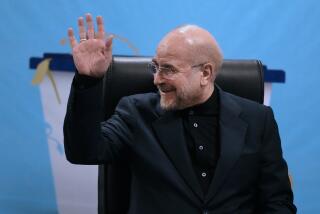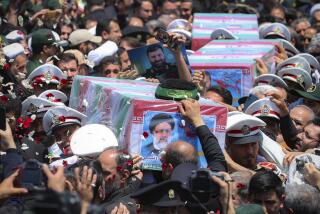Najaf’s Elite Clerics Playing Key Role in Iraq Now
- Share via
NAJAF, Iraq — Long gone are the days when the clergy and students in this city of shrines and seminaries confined their debates and studies to arcane questions of Islamic jurisprudence.
Now the talk in the libraries, teahouses and Internet cafes is almost always about politics: the deadlock over government formation in Baghdad, the violence between Shiite and Sunni Muslims, when to get American troops out of the country.
Most often, discussion turns to how much this city’s Shiite clerical establishment should participate in the governing of Iraq.
“The clergy are looking at what’s going on in the whole country with great concern,” said Ali Bashar Najafi, the son and spokesman of one of Najaf’s four grand ayatollahs. “So they’re very much involved in what’s going on.”
The once-secluded shrine city, suppressed and marginalized under Saddam Hussein’s rule, is now being pulled into Iraq’s political fray. Although they try to stay above politics -- in deliberate contrast to their clerical colleagues in neighboring Iran -- members of the Shiite marjaiyah, the clerical elite which is centered here, have repeatedly felt obligated to intervene in the country’s day-to-day affairs.
Some of those interventions have brought success. Others have set precedents and molded dependencies that even clerics here fear could shape the country’s future for the worse.
When the Golden Mosque in Samarra, one of Shiite Islam’s holiest sites, was destroyed in late February, word of the bombing reached here before the media reported it. Najaf’s four leading Shiite clerics, led by Grand Ayatollah Ali Sistani, quickly met to discuss the event and “tried directly and indirectly to control the anger of the people,” said Ali Mohammed Saeed Hakim, son and spokesman of another of the four grand ayatollahs.
The clergy issued a statement that called for peaceful demonstrations and forbade retaliation against Sunnis. When retaliatory violence began to taper off within days, Iraqi and American analysts credited the clergy with forestalling a full-scale civil war.
The clergy’s efforts to guide Iraq’s unruly politics have proved more frustrating.
Iraqi politicians, many with close family ties to the Shiite clergy, have shown no qualms about bringing the marjaiyah into their factional fights. They drive down from the capital in huge armed convoys, pepper the marjaiyah with questions and then publish the clergy’s answers as if they were proclamations, in effect turning religious rulings into political press releases. But the same politicians have been unable to form a widely acceptable government.
The sense that a long-awaited opportunity for the country’s Shiite majority to consolidate its status is being squandered adds urgency to the impromptu debates in the ancient alleys of the old bazaar, in the hallways of the seminaries and in the unadorned chambers of the senior clergy.
“We are of two feelings,” said Mohammed Kraedi, a representative of a Shiite cleric here. “We feel embarrassed about the government, but we also sympathize with the great and heavy burden on its shoulders.”
That burden includes the task of making up for the Shiites’ sense of deprivation, restoring rights and opportunities many think have been denied for centuries.
Najaf’s history haunts the cracked walls and alleys surrounding the Imam Ali shrine, believed to be the tomb of the prophet Muhammad’s son-in-law and cousin. Shiites believe Ali was murdered by tribal leaders in an attempt to usurp his family’s claim to the mantle of Islam.
Once toiling away in obscurity and isolation, the custodians of Najaf’s libraries, some with manuscripts dating back 1,300 years, now electronically scan ancient texts before e-mailing them to colleagues at scholarly institutes in Iran, Lebanon and the Indian subcontinent. They surf the latest news of violence on once-banned satellite television stations.
The city shows signs of newfound wealth. The crumbling two-story building off one of the maze-like alleyways of the old city where Iran’s Ayatollah Ruhollah Khomeini spent years in exile is being gutted and rehabbed, part of a modest real estate boom here that includes a proposed airport.
Even the shrine at the center of the city’s religious, cultural and economic life has been changed. The heavy green fence and dozens of armed men manning checkpoints around the shrine are signs of the city’s newfound importance amid Iraq’s Shiite resurgence but also of its vulnerability to the world’s troubles.
“Our Hawza [religious seminary] during Saddam’s time was only concerned with studying and the students were only concerned with their lessons,” said Sheik Abu Mohammed Baghdadi, a deputy to one of the leading clerics in Najaf.
“But the Hawza now has many options,” added Baghdadi, who has installed an Internet connection and satellite television in his sliver of a home in the old city. “Now the students have many choices: law, science and, of course, politics.”
Debates have raged here for decades between those who advocate that clergy get more actively involved in politics -- the model adopted in Iran under Khomeini -- and those, led by Sistani, who advocate a more reclusive role in order to maintain the clergy’s integrity.
Sheik Younis Rumeithi is one of the many clerics here who voice Sistani’s preference for a quiet role. “The line of politics is not a straight line,” he said. “This,” he added, pointing to a bookshelf full of religious texts in his office, “is the only straight line, the words in these books.”
Underlying much of the talk is the worry that hitching Iraq’s future to the religious establishment could push the nation toward the type of clerical rule found in Iran, where an unelected supreme leader such as Khomeini was has the final say on all matters of state.
“Although the marjaiyah has a long arm and influence over the Iraqi arena, it must not jump in and force its will,” Baghdadi said. “The government should depend on its own internal mechanisms. How can we connect the future of Iraq to someone who could pass away? If we set this precedent, what if someone who’s not as wise as Sistani comes along?”
Despite that admonition, Baghdadi serves on a committee that reviews Iraqi laws at the request of Shiite politicians to determine whether they are in accord with Islamic codes, part of what some worry is an unstoppable drift toward greater involvement of the clergy in matters of state.
Even Sistani took a more active approach in the months after the 2003 U.S.-led invasion. With him at the helm, the clergy played a key role in getting the occupation authority to hold democratic elections before the writing of a constitution. In January 2005 elections, the main Shiite coalition had the implicit blessing of Sistani.
The grand ayatollah faded into the background after those first elections. But in recent weeks, the clergy have begun entering the fray with greater urgency once again, issuing statements urging Iraq’s squabbling Shiite factions to quickly come up with a viable candidate for prime minister and pointing out the government’s failings.
“The politicians, who reached their posts on the shoulders of the voters, have no intention but to stick to their chairs, and to loot,” one of the ayatollahs said in a recent statement.
Many of those politicians have deep connections to the clerical leadership.
Ibrahim Jafari, the prime minister embroiled in a fight for his political life, hails from the nearby shrine city of Karbala, and his wife is a descendant of a prominent ayatollah.
Abdelaziz Hakim, leader of a political party within the Shiite bloc that opposes Jafari, is the latest in a famed line of clerics as well as a relative of Grand Ayatollah Mohammed Saeed Hakim.
Muqtada Sadr, the radical cleric whose 35 or so loyalists in parliament back Jafari, is the son of a famous Najaf ayatollah and still lives here, preaching Fridays at the nearby mosque in Kufa.
Hussein Shahristani, a parliament member and leader of the so-called independents in the Shiite alliance, is a relative of Sistani.
“All these political groups came into power under Sistani’s flag,” said Seyed Mohsen Khoei, 45, grandson of the late Grand Ayatollah Abul-Qassim Khoei, Sistani’s mentor. “Now there are some worries about whether they can manage now that they’re in power.”
These worries are prompting some here to argue that the clerics must, once again, take a more prominent role lest they become irrelevant as more and more young Shiites ignore the pacifist rhetoric of the senior clerics in favor of vengeance.
“We are very much afraid that the marjaiyah is losing its influence because of the terrorist pressures on the society,” said Fallah Aliywah, head of the Hikmeh Islamic Institute for Education, a publishing house in Najaf.
“The marjaiyah knows better than to step in without being asked,” Aliywah said. “The marjaiyah doesn’t just express opinions on its own. But it will not close their doors to those who come to ask for advice. Their only responsibility is only to guide people, not to interfere in people’s affairs.”
At the same time, as the events after the destruction of the Golden Mosque showed, Iraq has no other institution that can rival the clergy’s legitimacy and power.
“Sometimes the government makes mistakes, and maybe sometimes the mistakes are so big that the marjaiyah should intervene,” cleric’s representative Kraedi said.
“Sometimes the marjaiyah is the only one who can stop them. After all, this society is not moved by politics but by the marjaiyah.”
More to Read
Sign up for Essential California
The most important California stories and recommendations in your inbox every morning.
You may occasionally receive promotional content from the Los Angeles Times.












